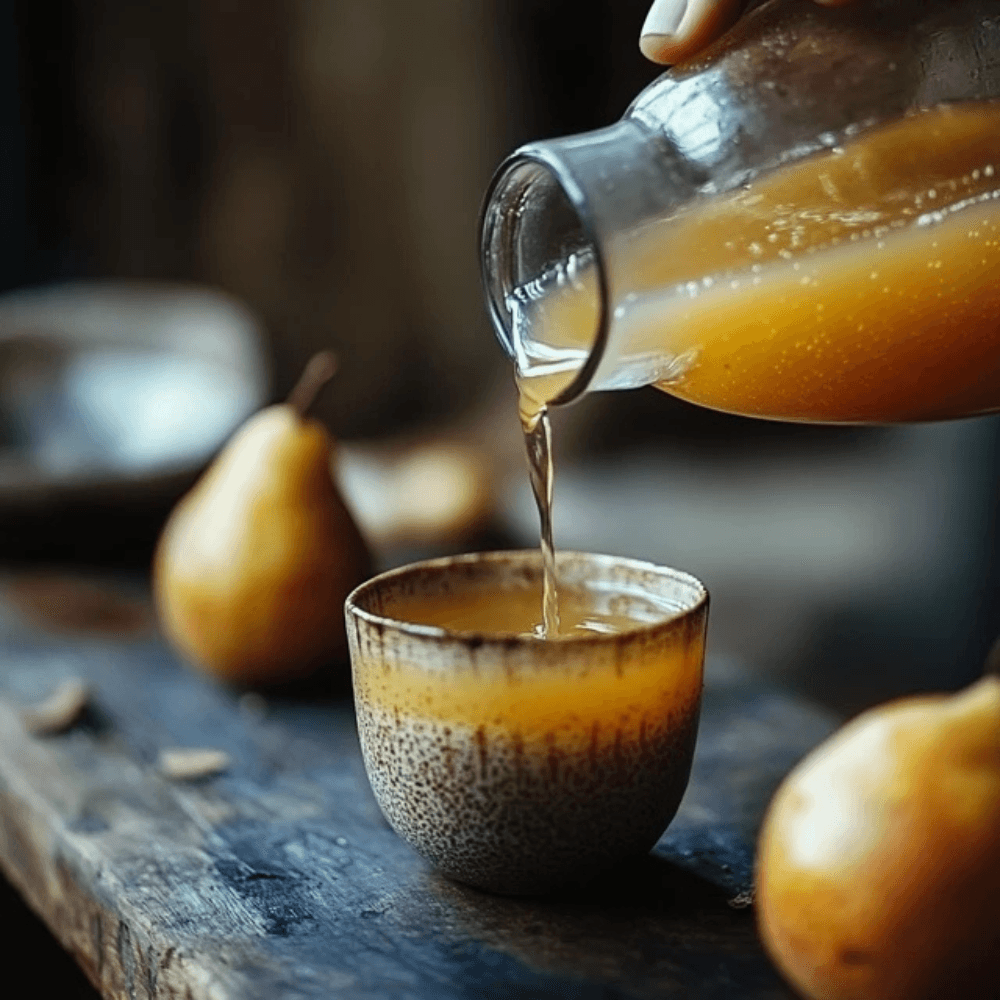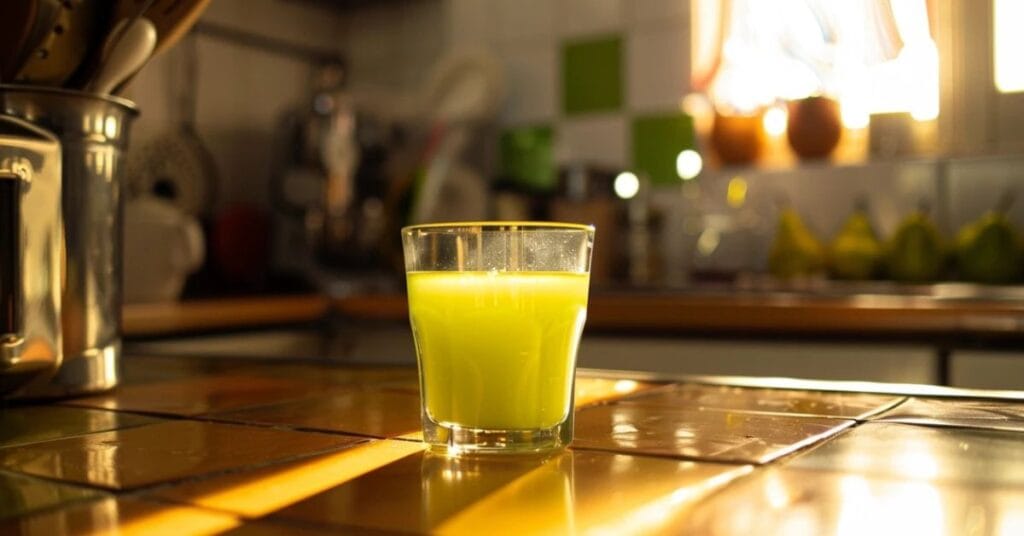Pear juice has long been celebrated as a natural remedy for various digestive issues, but is pear juice good for the bowels? This question leads us to explore its properties, traditional uses, and scientific insights into how pear juice supports gut health. Rich in nutrients and offering potential benefits for regular bowel movements, pear juice stands as a gentle yet effective aid for digestive wellness. Many have turned to it not only for hydration but also for its unique compounds that encourage regularity and relieve constipation.
With a growing interest in natural alternatives to pharmaceuticals, pear juice has gained attention for its sorbitol content and dietary fiber, both of which play crucial roles in maintaining gut motility. Let’s dive into answering how good pear juice for the bowels, nutritional makeup and see how this delightful drink can be incorporated into your routine.
The Nutritional Composition of Pear Juice
Pear juice is not only delicious but also packed with nutrients that make it a popular choice for those seeking digestive support. Its composition of essential vitamins and minerals contributes to its remarkable health benefits. For instance, vitamin C helps in reducing inflammation, while potassium supports smooth muscle contractions in the intestines.
Vitamins and Minerals
The juice is a rich source of antioxidants, which combat oxidative stress and promote cell health. Additionally, its potassium content aids in maintaining electrolyte balance, a crucial factor for proper muscle functioning in the digestive tract. Pear juice also contains small amounts of magnesium and vitamin K, both of which further enhance bowel health.
A single glass of pear juice can provide up to 15% of your daily recommended potassium intake, making it a simple yet effective dietary addition.
Fiber and Sorbitol in Pear Juice
One of the standout components of pear juice is sorbitol, a naturally occurring sugar alcohol that acts as a gentle laxative. Unlike harsher chemical alternatives, sorbitol helps draw water into the intestines, softening stools and encouraging smooth bowel movements. Not only that, but the juice also contains soluble fiber, which fosters gut motility by bulking up stool.
In comparison to other fruits, pear juice’s combination of fiber and sorbitol makes it uniquely effective for digestive issues. For more on sorbitol’s digestive benefits, refer to this informative guide.
How Pear Juice Supports Digestive Health
Pear juice offers multiple pathways to improved gut health, making it a trusted choice for individuals experiencing occasional or chronic constipation. Its unique blend of hydration and nutrient support allows it to work gently yet effectively.
The Role of Fiber in Pear Juice
Dietary fiber, found abundantly in pears, plays a pivotal role in regulating digestion. It helps form bulkier stools, which pass more easily through the intestines. The fiber also nourishes gut-friendly bacteria, promoting a balanced microbiome. For a detailed look at fiber’s impact on digestion, see this comprehensive article.
Sorbitol Content in Pear Juice and Its Role in Digestion
Unlike fiber, sorbitol directly impacts stool consistency. It acts osmotically, drawing water into the intestines and softening stools for easier expulsion. This mechanism makes pear juice a go-to option for those dealing with irregular bowel movements. Furthermore, the natural sweetness of sorbitol ensures that the juice is palatable for both children and adults.
In summary, pear juice combines hydrating properties, nutritional support, and natural laxative effects to enhance digestive health without the side effects of synthetic medications.
Is Pear Juice Good for the Bowels? A Closer Look

For those seeking natural ways to improve gut health, the question arises: Is pear juice good for the bowels? The answer lies in its ability to act as a gentle laxative while providing essential nutrients that promote digestive wellness. Not only does pear juice aid in relieving constipation, but it also enhances overall gut function by supporting regular bowel movements and improving stool consistency.
How Pear Juice Promotes Bowel Movements
The answer to how good pear juice for the bowels and the secret behind pear juice’s efficacy lies in its hydrating and nutrient-rich composition. It works by introducing moisture into the digestive tract, preventing the formation of hard, dry stools that are difficult to pass. Moreover, the presence of soluble fiber bulks up stools, making them easier to eliminate.
Not only that, but sorbitol, a compound naturally found in pears, acts as a mild osmotic laxative. This means it pulls water into the colon, softening stools and ensuring smoother bowel movements. In comparison to other remedies like prune juice, pear juice is often preferred for its milder flavor and gentler effect on the stomach.
Quick Tip: Drinking a glass of pear juice on an empty stomach in the morning can significantly enhance its stool-softening effects.
Comparing Pear Juice to Other Natural Laxatives
When it comes to natural remedies for constipation, pear juice competes with prune and apple juices. Each has unique properties, but pear juice stands out for its balanced sweetness and higher sorbitol content. For instance, while prune juice is rich in fiber, its strong flavor may deter some from regular consumption. Apple juice, though mild, contains less sorbitol and fewer bowel-stimulating compounds.
Here’s a comparative breakdown:
| Juice | Fiber Content | Sorbitol Content | Flavor Profile |
|---|---|---|---|
| Pear Juice | Moderate | High | Mild and pleasant |
| Prune Juice | High | Moderate | Strong and distinctive |
| Apple Juice | Low | Low | Sweet and light |
In short, pear juice offers a middle ground—effective yet palatable—making it an ideal choice for individuals of all ages.
Pear Juice for Constipation Relief
Is pear juice good for the bowels? Pear juice has been recognized for centuries as a natural remedy for constipation, thanks to its unique properties that promote gut health. Traditional uses and modern scientific studies alike highlight its efficacy in relieving digestive discomfort without harsh side effects.
Traditional Uses of Pear Juice for Constipation
Historically, pear juice has been a go-to solution in many cultures. For example, in East Asian medicine, pears are believed to have cooling properties that soothe inflamed digestive systems. Additionally, European folk remedies often included pear juice as a treatment for sluggish digestion and mild constipation.
“An apple a day keeps the doctor away, but a pear juice glass eases the way.” This saying underscores the traditional belief in pears’ gentle laxative power.
Modern Studies on Pear Juice and Constipation
Recent research validates these long-held beliefs. Studies have demonstrated that the sorbitol and fiber content in pear juice works synergistically to alleviate constipation. Unlike over-the-counter laxatives, which can disrupt gut flora, pear juice supports a healthy balance of bacteria while addressing digestive blockages.
Moreover, regular consumption of pear juice has been linked to improved hydration levels, which play a crucial role in preventing constipation. For further insights, explore studies like this medical review.
Hydration Benefits
Hydration is a key factor in maintaining digestive health, and pear juice excels in this regard due to its high water content. It not only replenishes lost fluids but also aids in the smooth functioning of the digestive system.
High Water Content in Pear Juice
Every glass of pear juice contains approximately 85% water, making it an excellent choice for those struggling with dehydration-induced constipation. When the body lacks sufficient hydration, the colon absorbs more water from stools, leading to hard, dry bowel movements. Pear juice combats this by restoring fluid balance, ensuring stools remain soft and easy to pass.
Quick Stats:
- Water content per 8 oz of pear juice: ~7.5 oz
- Daily hydration contribution: ~20% of recommended intake for adults
Enhancing Digestion with Proper Hydration
Drinking pear juice regularly creates a synergistic effect between hydration and dietary fiber. Together, these elements ensure that food moves smoothly through the digestive tract, reducing strain and discomfort. Not only does this combination improve bowel movements, but it also promotes a healthier gut environment by fostering beneficial bacteria.
In essence, pear juice is more than just a thirst quencher—it’s a functional beverage that supports bowel health in multiple ways.
Potential Side Effects of Pear Juice on Bowel Health
While pear juice offers numerous digestive benefits, overconsumption or individual sensitivities can sometimes lead to adverse effects. It is important to consume pear juice in moderation and be aware of potential side effects to maintain optimal digestive health.
Risks of Overconsumption
Drinking excessive amounts of pear juice can lead to diarrhea, bloating, or abdominal cramps. This is primarily due to its high sorbitol content, which, although beneficial in moderate quantities, may overstimulate the bowels when consumed excessively. Moreover, the natural sugars in pear juice can sometimes cause discomfort in individuals with sensitive stomachs or irritable bowel syndrome (IBS).
For more details on the digestive risks of excess pear juice, this comprehensive resource offers further insights.
Allergies and Sensitivities to Pear Juice
Although rare, some people may experience allergic reactions to pear juice. Symptoms might include itching, swelling, or gastrointestinal distress. These reactions are more common in individuals with a known fruit allergy or sensitivity to specific enzymes in pears.
Important Note: Those with a history of food allergies should consult a healthcare professional before incorporating large amounts of pear juice into their diet. This ensures that potential allergens or irritants are identified early.
Quick Tips for Safe Consumption:
- Start with small quantities, especially if trying pear juice for the first time.
- Combine pear juice with other ingredients like water or herbal teas to dilute its strength.
Incorporating Pear Juice Into a Digestive Health
Routine

Integrating pear juice into your diet can be simple and effective for improving gut health. From proper timing to creative recipes, there are many ways to enjoy its benefits while avoiding potential downsides.
Best Practices for Consuming Pear Juice
To maximize its digestive benefits, consume pear juice in moderation—ideally 4–8 ounces daily. Drinking it on an empty stomach in the morning can enhance its natural laxative effects, while pairing it with meals rich in fiber and protein can provide balanced nutrition.
Additionally, opting for freshly made pear juice ensures you receive the full nutritional value without added sugars or preservatives often found in store-bought versions.
Recipes and Combinations for Digestive Support
Adding a creative twist to pear juice can make it even more enjoyable and beneficial. For instance:
- Pear and Ginger Smoothie: Blend pear juice with fresh ginger and a dash of honey for a refreshing digestive tonic.
- Mint-Infused Pear Cooler: Combine pear juice with sparkling water and fresh mint leaves for a light, hydrating beverage.
These combinations not only enhance flavor but also introduce complementary digestive aids like ginger and mint, which soothe the stomach and improve gut motility.
Alternatives to Pear Juice for Digestive Health
While pear juice is an excellent choice for bowel health, other foods and beverages can also support digestion effectively. Exploring these options allows for variety and additional benefits in a well-rounded diet.
Comparing Pear Juice to Prune Juice
Prune juice is another popular natural laxative, often compared to pear juice. While both are effective, prune juice is richer in insoluble fiber, which works differently from the soluble fiber in pear juice. Prune juice is more potent but may not be suitable for those with a sensitive digestive system due to its stronger flavor and higher sugar content.
| Aspect | Pear Juice | Prune Juice |
|---|---|---|
| Fiber Content | Soluble fiber | Insoluble fiber |
| Sugar Content | Moderate | Higher |
| Taste Profile | Mild and sweet | Strong and distinct |
Other Fiber-Rich Foods and Drinks
Beyond juices, incorporating fiber-rich foods like oatmeal, flaxseeds, and psyllium husk into your diet can significantly improve digestion. Paired with adequate hydration, these options ensure smoother bowel movements and reduced digestive discomfort.
For optimal results, alternate between pear juice and these fiber sources to maintain a diverse and balanced digestive health routine.
FAQs About Benefits of pear juice For the Bowels
Can pear juice help with chronic constipation?
Yes, pear juice can be an effective remedy for chronic constipation due to its fiber and sorbitol content. Unlike harsh laxatives, it provides gentle relief by softening stools and promoting natural bowel movements. However, for persistent constipation, consulting a healthcare provider is recommended.
How much pear juice should I drink for bowel health?
For most adults, consuming 4–8 ounces daily is sufficient to support digestion without causing adverse effects. Starting with smaller amounts is advisable, especially for those new to pear juice, to gauge tolerance.
Is pear juice safe for children with digestive issues?
Yes, pear juice is generally safe for children and can be a natural remedy for occasional constipation. However, it should be given in smaller quantities, typically around 2–4 ounces, to avoid overconsumption and potential side effects like diarrhea.
Does pear juice work better than whole pears for digestion?
Both pear juice and whole pears offer digestive benefits, but they work differently. Whole pears provide more dietary fiber, which promotes long-term gut health, while pear juice acts faster due to its liquid form and higher sorbitol concentration. Combining the two can offer comprehensive digestive support.
Are there any risks to mixing pear juice with other remedies?
Mixing pear juice with other natural remedies like ginger or mint is generally safe and can enhance its digestive benefits. However, avoid combining it with other laxatives or highly acidic beverages, as this might overstimulate the digestive system.
Final Thoughts
Pear juice is a versatile and effective option for those seeking natural solutions to improve digestive health. Its unique combination of fiber, sorbitol, and hydration properties makes it a powerful yet gentle remedy for constipation and irregular bowel movements. Whether consumed as part of a morning routine or paired with other digestive aids, pear juice offers tangible benefits without the risks associated with synthetic laxatives.
“Incorporating pear juice into your diet not only supports bowel health but also contributes to overall hydration and nutrient intake.”
Moderation is key to avoiding potential side effects like diarrhea or bloating. For those with specific dietary needs or sensitivities, consulting a healthcare professional ensures safe and effective use.
By understanding its benefits and integrating it thoughtfully, pear juice can become a staple in a balanced approach to gut health. Whether enjoyed on its own or in creative recipes, this natural beverage proves that simple solutions can yield significant results.






